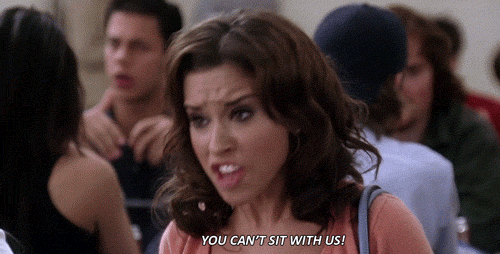 Ignore this post if you wish. Read it if you’re interested. It is not a post about mean girls. It’s a post about the dissonance in the lives of so many people; it’s a post about struggle; it’s about love and hate, being in and being out. Ultimately, it’s a post about people whom the church has told: “you can’t sit with us.”
Ignore this post if you wish. Read it if you’re interested. It is not a post about mean girls. It’s a post about the dissonance in the lives of so many people; it’s a post about struggle; it’s about love and hate, being in and being out. Ultimately, it’s a post about people whom the church has told: “you can’t sit with us.”
 The 2004 instant classic movie “Mean Girls” has a scene where the queen-bee is gaining weight and wears sweatpants to school on a day that is not “allowed” by the group. She’s quickly informed that doing so is against the rules and she can’t sit with them. She protests that those rules aren’t real and that their friendship and bond should be stronger (she doesn’t use those words, but that’s the gist of it.) If this were a lifetime movie, her friends would have realized the truth of that and allowed her to sit. Instead, Gretchen frustratedly utters the line, “You can’t sit with us!”
The 2004 instant classic movie “Mean Girls” has a scene where the queen-bee is gaining weight and wears sweatpants to school on a day that is not “allowed” by the group. She’s quickly informed that doing so is against the rules and she can’t sit with them. She protests that those rules aren’t real and that their friendship and bond should be stronger (she doesn’t use those words, but that’s the gist of it.) If this were a lifetime movie, her friends would have realized the truth of that and allowed her to sit. Instead, Gretchen frustratedly utters the line, “You can’t sit with us!”
Now, imagine you’re Regina George. You can’t sit with your best friends because you’re wearing the wrong pants. (Let’s ignore the fact that they aren’t really great friends, we all know that.) Or perhaps this doesn’t resonate with you well. I want you to be able to connect with this post as well as possible, so let me bring up another example. Imagine you’re Rudolph and you’re not allowed to participate in any reindeer games because of your nose.
This next one may be the best example, but it’s not that relatable to me. Somehow you find yourself attending both the University of Michigan (or Michigan State) and Ohio State University (or some other really heated rival schools). You find that while you identify and love both, you never really feel really welcomed by either; you’re always kept at an arms distance because of your relation with the “other school.” You’re welcomed on conditions. While most people would never readily admit this, you know it to be true. There’s something about the relationship between the two that makes them mutually exclusive.
“What does this have to do with anything?” you’re probably asking. If you’re connecting the dots on your own, I applaud you; if you’re not, then I’ll tell you. There’s a group of us (albeit small) that live out these very scenarios day in and day out. This group is that of Christian Homosexuals (hereafter known as Christian Mos because “homosexuals” is too long to type all the time, and “homo” has evolved a negative connotation). There’s a difficulty to the life of a Christian Mo that nobody else could ever understand.
Christians see Mos as a detriment to both society and faith (the majority of them), and most Mos see Christians are judgmental bigots (because many are). There’s a tension in the life of the Christian Mo between being a Christian and being a Mo. People always seem to pit each part of you against the other. While it’s mostly within the Christian circle, it’s prevalent within both communities. Many Mos ask Christian Mos how they can be Christian. “How do you reconcile that with your faith?” is a question all Christian Mos are tired of hearing. The simple answer: there’s nothing to reconcile. But it gets worse than that. I’ve even had people tell me “we can’t be friends because I don’t get along with religious people.” How sad is that?
All the blame isn’t to be placed on the Mo community. Most of their tension comes from the reaction they’ve had with the Christian community where things have gone sour. I’ve found there to be many unspoken rules within the Christian community that, once you’ve violated them, suddenly they shout at you, “you can’t sit with us!” One of these rules takes things that nearly all Christians hold to be true and adds a simple phrase afterwards beginning with “unless…” Let’s take a look at a few of them for a moment.
2. “Come just as you are, unless…”
3. “We love everyone, unless…”
4. “Jesus loves you, unless…”
5. “It’s not our place to judge, unless…”
Those are just five, but there are plenty more. I’m sure you can guess what follows the “unless.” (If you can’t, it’s “… you’re a Mo”.) I’ll admit there are very few Christians who would say this to someone outright (the WBC being a notable exception) but most say it in the way they act and talk, and most churches say it in the way they do leadership.
All of these can be exampled in a recent (and brief) conversation between a pastor in my area and myself. I went to a new church plant on Sunday. It seemed to be a church based on loving people and helping them grow spiritually and personally. I had some comments about the service that I wanted to share with the pastor, and even talked with the worship leader about getting involved (they were looking for a piano player so it was perfect.)
I asked the pastor the church’s stance on homosexuality. He replied saying that it’s not part of God’s plan and that anyone who “practices homosexuality” is welcome to attend but will not be allowed to partake in leadership. But he made sure to stress that they loved Mos, just not what they do. He went on to say that he assumes by my asking that that’s the lifestyle I’ve chosen and if not he’d be happy to discuss things further with me.
Let’s take the above list and see which are present in this classic response from the pastor.
1. “All sins are the same, unless…”
I’m not here to argue whether or not homosexuality is right or wrong. I’ve done that before. What I am here to do is describe the struggles of being a Christian Mo. Now, if you think being a Mo is wrong, that’s fine. However, you can’t use “it’s not part of God’s plan” as a reason for excluding someone from leadership unless other things that are “not part of God’s plan” are also grounds for exclusion such as divorce, gluttony, lying, lust, gossip, etc. That, however, would leave nearly everyone unfit for leadership, so churches refuse to do that. So, while they say “all sins are the same” what they really mean is “we’ve made it so most sins are the same, but some are not and we’ll only let that be known when it comes up.”
3. “Come just as you are, unless…”
I would like to send you to a quick youtube clip of my favorite spoken word for this one. In order to actually love someone, you have to know them. You have to take the time to get to know who they are, what makes them tick. You cannot simply write them off and say, “but we love you.” That’s not how love works, not the love that Jesus modeled.
While the pastor in this instance never actually judged me or Mos per se, , he did judge that I was living this “lifestyle” simply by asking the question. Perhaps I have a loved one who is a Mo, or simply friends that are. I could be asking for their sake. Instead he, admittedly, assumed that it was about me. That’s judging someone right there.
These aren’t the only rules that Christians have either. The idea that one can be a Mo and not practice that lifestyle is another rule. It’s saying, “it’s okay to be attracted to someone of the same gender, but as soon as you act on it, you’re not allowed to sit with us.” As soon as you choose that “lifestyle” you’re suddenly excluded. The most prominent rule, however, is the unspoken “don’t ask, don’t tell policy” that’s within the church. As long as nobody knows that someone is a Mo everything is okay. People can suspect it or question it, that’s fine. But as soon as it’s out in the open and someone is honest about it, then everything blows up. The funny thing about that one is it fits into the “unless” rule from above. “We want you to be open about yourself unless you’re a Mo.”
The last rule I want to discuss is probably the most telling. You’re welcome to go to church even if you’re a Mo unless you start to rock the boat. As soon as you start to question the powers at be (something that Jesus did constantly, mind you) things change. I replied to the pastor’s email with this simple response:
“It’s impossible to love the person and not accept and support them in the deepest human desire of their heart. I know you won’t believe that, since you have no access to the truth of it, but it’s the truth. Jesus never excluded anyone from leadership. He welcomed all and allowed them to partake in His ministry. Any church that doesn’t do that is failing to fulfill His mission; it’s failing to speak the voice of more into people’s lives.
I pray that (Church Name) realizes this and changes their position on the issue.”
He never replied to that email. He did, however, invite me to a church event over Facebook. I declined the event. Facebook then prompted me to write on the “wall” of the event explaining why I wasn’t going. I decided to go for it. I stated, “I cannot attend the event because (Church Name) does not love and embrace their homosexual brothers and sisters in the same way they do the rest.” I wasn’t trying to be spiteful, I was simply trying to bring the issue to light, to at least start a discussion. What was the recourse? The pastor has since blocked me from Facebook.
As soon as you rock the boat in the Christian community you’re an outcast (like Rob Bell was for a while) and that’s especially true when it comes to defending Mos. In blocking me, the pastor showed me just how true these rules are (and exampled, again, nearly all of the above “unless” statements).
These “rules” are the very reasons that the Mo community has such animosity toward the Christian community. Put these two together and you have nothing but near-constant turmoil in the life of a Christian Mo. As someone who loves Jesus and others, but also is a Mo, life is harder than anyone else. The two biggest parts of one’s identity (their faith and their desire for love) are put in constant tension by the two groups they belong to, and it’s not okay.
Now, this isn’t only a pity party here. I’m not trying to say, “woe is me, my life is so hard.” If you know me, you know I constantly try to make the most of things. This is an example of that. I’m shining the light on the issue so people can acknowledge the problem for what it is and hopefully begin to do something about it. If churches began to take the high road (unlike the plastics in “Mean Girls”) and recognize that the bond of Christ and love for Him is stronger and more important than any “rules” we’d stop telling Mos (and many other people) they can’t sit with us. We’d help put an end to turmoil raging in the hearts of Christian Mos that long to be at church worshiping but cannot do so in a place where they are not celebrated as a person and allowed to participate in the same ways as their hetero brothers and sisters. We’d stop Christian Mos from walking away from the faith because they simply cannot handle being told “you can’t sit with us” anymore. Even more importantly, it would stop young Mos from trying to commit suicide because they hate their lives and can’t reconcile the two aspects of their lives that are portrayed as mutually exclusive. And, ultimately, we’d stop people (Mos and hetero non-Christians alike) from seeing Christians as judgmental bigots; we’d finally truly show Christ’s love to the world like we’ve been called to do. The world would be a better place for everyone this way.






2 Responses
Thank you for posting this. You have really done a good job of explaining a topic that has been a real issue and struggle in my life as well as countless other people. I hope more people will start to realize what an issue this is and how off-putting it can be to Christian Mos and allies.
Anonymous,
Thanks for commenting! I don't know your situation but, if you're able, please share this with people so they too can better understand the struggles the church, and, especially, Christians who identity as LGBT+ or allies, are facing.
Comments are closed.